Strength and Conditioning Explained | Ultimate Guide
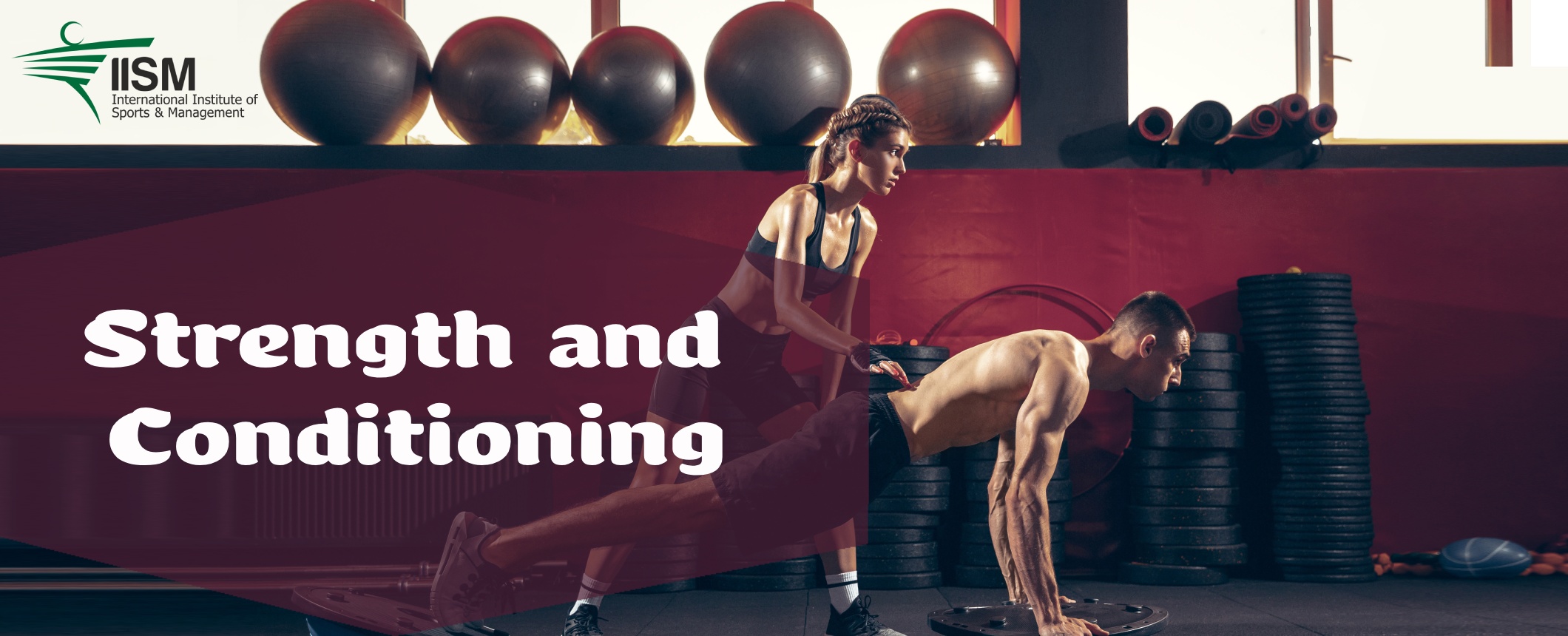
Ever wondered how athletes above the age of 35 or 40 can play with such finesse?
Ever wondered how athletes achieve such incredible feats of strength, speed, and endurance?
Well, it is because of their comprehensive strength and conditioning training program.
Strength and conditioning plays an important role in improving their performance and movement. Now, you might be wondering what strength and conditioning is and how this technique, unheard of until now, is helping athletes improve their game.
Well, strength and conditioning is not a new concept. It has been a part of athlete training for a long time. But due to a lack of trained strength and conditioning coaches, this career path never saw the light of day until recently.
Nevertheless, here is a deep-dive into the concept and its career pathway along with relevant skills and reasons on why you should consider pursuing becoming a strength and conditioning coach.
What is Strength and Conditioning?
Strength and conditioning is a scientific method that selects and develops static or dynamic exercises to improve movement quality and performance. It is more than just lifting weights and running sprints. It is a science-based approach to optimising an athlete’s physical abilities and reducing any risk of injury.
The method is based on thorough research in exercise physiology, biomechanics, and an understanding of human anatomy.
The primary focus of strength and conditioning is to improve movement quality in order to assist athletes in enhancing their efficiency, agility, endurance, and drive. The training designed in strength and conditioning not only helps athletes remain in their best form but is also beneficial for every human being as we all move.
The secondary focus is to reduce incidents that would lead to serious injuries. This is also achieved by improving the movement pattern. Training under the expertise of an expert strength and conditioning coach is a great way to transform your body and get better results.
Be it a seasoned pro, an amateur athlete, or an elderly person working on balance to avoid falling too much, everyone can reap the benefits of strength and conditioning.
Check out our podcast with Mr. Ramji Srinivasan, a renowned strength & conditioning coach. In this podcast he has elaborated on the several components that determine Strength and Conditioning. He also elucidated how strength and conditioning has evolved in India and grown exponentially thus improving the performance of athletes.
What does a Strength and Conditioning coach do?
The strength and conditioning coach will work with coaches, trainers, and other support staff who look after the training programs of the athletes or the team.
The role of a strength and conditioning coach is to:
-
Identify the needs of the athlete or team and design training programs.
-
Maintain and analyse the workout patterns.
-
Suggest expert advice for improving their performance.
-
Train athletes and teams with proper techniques and by educating them about the importance of strength & conditioning.
-
Ensure the athletes or teams adhere to the training program.
-
The coach will also have to prepare a manual for enhancing a range of movements, strength testing, physical testing, power testing, resistance training, conditioning training, agility drills, and many more.
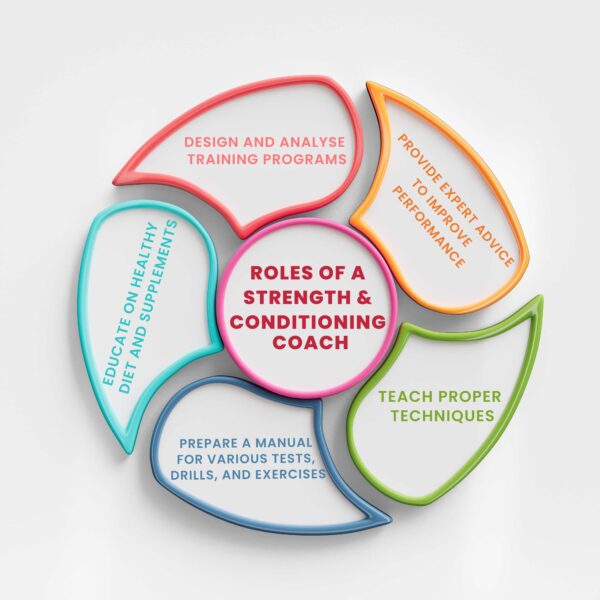
Roles of Strength & Conditioning Coach
-
The coach will also have to explain the importance of a healthy diet and supplements and teach them methods that will aid in recovery after an injury.
-
The strength & conditioning coach will also have to ensure the doctors, physiotherapists, and support staff are also in the best condition.
Principles of Strength and Conditioning
When it comes to delivering the best results, there is no shortcut to success. It all comes down to a systemic approach to carefully designing the training regimen by following the seven principles of strength and conditioning.
These principles then become the foundation on which the strength and conditioning coach designs effective training programs that help athletes reach their peak performance.
1. Individuality
The principle of individualisation states that each athlete is unique and responds differently to the same training stimulus. Therefore, the coach cannot apply a one-size-fits-all approach to training but rather tailors the program to suit the specific needs and characteristics of each athlete.
2. Specificity
The principle of specificity states that the training stimulus must match the desired outcome of fitness. For example, to improve endurance, the strength & conditioning coach must design exercises that challenge the athlete’s aerobic capacity.
The coach cannot expect the athlete to develop endurance by doing the same exercises as the rest of the team that may have different fitness goals.
3. Overload
The principle of overload states that athletes need to increase the intensity, frequency, or duration of their training to see better results. Only by applying a greater stimulus than the body is used to will athletes be able to improve their endurance and stamina.
However, the coach must also monitor the athlete’s recovery and adaptation to avoid overtraining and injury. Therefore, the coach will gradually and systematically push the athlete to go beyond their comfort zone and work on getting better results.
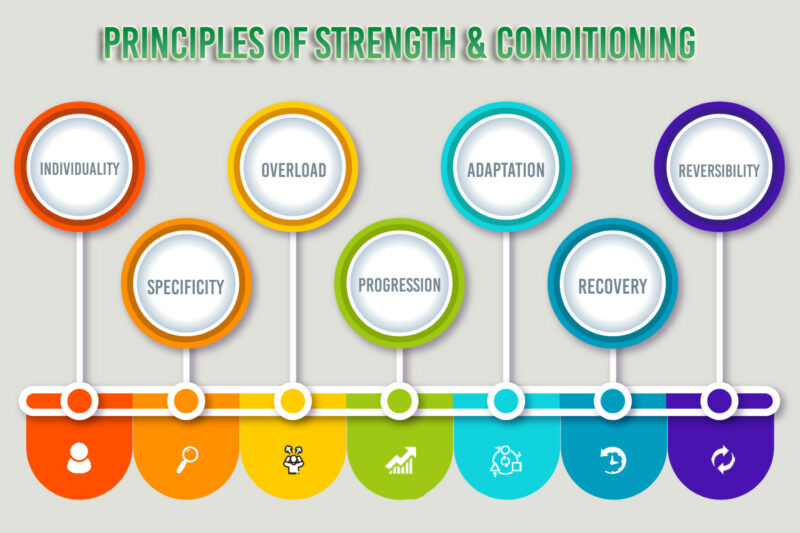
Principles of Strength & Conditioning
4. Progression
The principle of progression states that the training stimulus must be increased over time to achieve optimal results. The coach will help the athlete to gradually increase the intensity, frequency or duration of the workout, depending on their goals and fitness level.
This helps the athlete to challenge their body, avoid plateaus, and achieve measurable improvements.
5. Adaptation
The principle of adaptation states that the body adjusts to the training stimulus over time and becomes more efficient and resilient. This results in the athlete improving their performance and reducing their risk of injury. However, if the same training program is applied for too long, the body will stop adapting and reach a stagnant point.
Therefore, the coach will vary the training periodically to keep challenging the body and stimulating further adaptation. The coach will also ensure that the athlete gets adequate recovery between workouts to allow the body to heal and grow stronger.
6. Recovery
The principle of recovery states that the body needs time to restore its energy and repair the muscle damage caused by training. Without adequate recovery, the body will not be able to adapt and improve, and the athlete will experience fatigue, soreness, and an increased risk of injury.
The coach will plan the training schedule to include rest days and active recovery sessions, such as low-intensity exercises or stretching. The coach will also advise the athletes on how to optimise their sleep quality and quantity and how to eat a balanced diet that supports their recovery and performance.
7. Reversibility
The principle of reversibility states that the benefits of training are not permanent and can be lost if the training stimulus is reduced or stopped. The body will revert to its pre-training state and lose the speed, strength, and endurance it has gained through training. This principle emphasises the need for consistent and appropriate training to maintain and improve performance.
The coach will monitor the athlete’s training frequency and intensity and adjust them according to the athlete’s goals and fitness level. The coach will also help the athlete prevent or minimise the loss of fitness during periods of injury, illness, or inactivity.
Now that we have gone over the principles of strength and conditioning, let’s look at how you can become a strength and conditioning coach and implement these principles in the training program.
How to become a Strength and Conditioning coach?
If you are interested in becoming a strength and conditioning coach, here are some steps you can follow:
1. Get a degree in a related field
Although not mandatory, having a degree in sports science, exercise science, kinesiology, sports medicine, or a similar discipline can give you a solid foundation of knowledge and skills for this career.
You will learn about human anatomy, physiology, biomechanics, nutrition, and other topics relevant to strength and conditioning. A degree can also help you meet the minimum eligibility requirements for some certifications and open more opportunities for employment and advancement.
To become a trained strength and conditioning coach, you can also enrol in the Master of Sports Science at IISM. Watch this video on to know more about our Master of Sports Science degree program.
2. Get a certification from a reputable organisation
There are several organisations that offer strength and conditioning certifications, such as the National Strength and Conditioning Association (NSCA), the International Sports Science Association (ISSA), the National Academy of Sports Medicine (NASM), and Setanta College.
These certifications require you to pass an exam that tests your theoretical and practical knowledge of strength and conditioning. Some of them also require you to have a degree, CPR/AED certification, or work experience in the field.
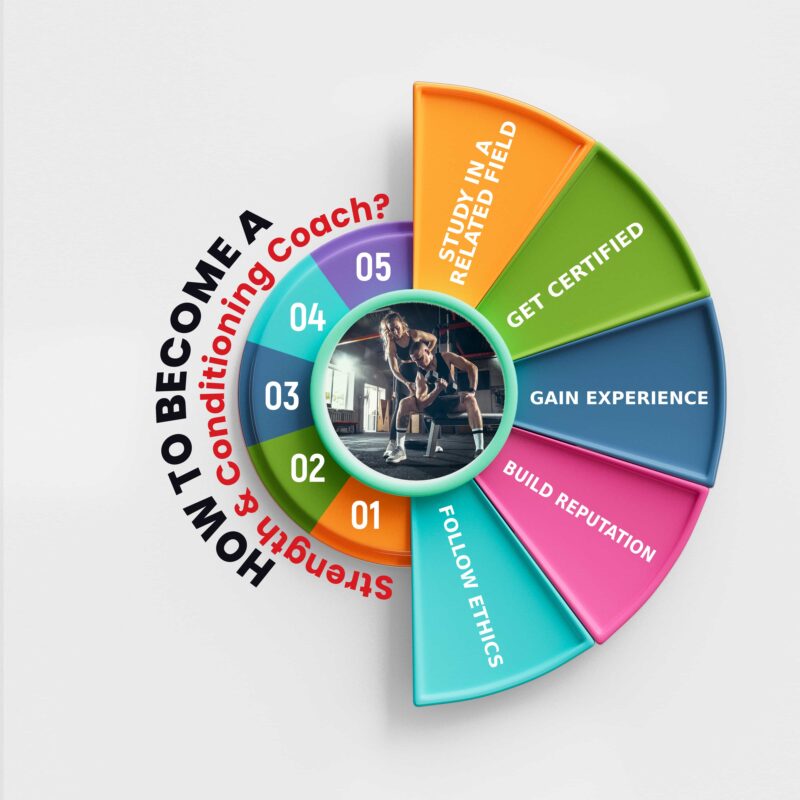
How to Become a Strength & Conditioning Coach
3. Gain practical experience
One of the best ways to learn and improve your skills as a strength and conditioning coach is to work with athletes in different settings and contexts. You can look for internships, volunteer opportunities, or entry-level jobs at gyms, fitness centres, sports clubs, schools, colleges, or professional teams.
You can also network with other coaches, trainers, and mentors who can guide you and give you feedback. You should aim to work with athletes of different ages, levels, backgrounds, and sports to broaden your exposure and expertise.
4. Build your reputation and clientele
As a strength and conditioning coach, you need to market yourself and your services to potential clients and employers. You will have to create a portfolio or resume that will showcase your qualification, certifications, experience, achievements, testimonials, and a few samples of your work.
You can also make the utmost use of social media platforms such as Instagram, Facebook, YouTube, or LinkedIn to promote yourself and share your expertise with others. You can also join online communities or forums where you can interact with other coaches and athletes who share your interests and goals.
5. Follow ethical standards and professional guidelines
As a strength and conditioning coach, you have a responsibility to uphold the highest standards of ethics and professionalism in your work. You should respect the rights, dignity, privacy, and confidentiality of your clients and colleagues.
You should also follow the rules and regulations of the organisations or institutions you work for or with. You should also adhere to the code of conduct or ethics of the certification bodies or associations you belong to.
Being a strength and conditioning coach can be a rewarding and fulfilling career that allows you to make a positive impact on the lives of others.
Reasons to become a Strength and Conditioning coach
Strength and conditioning coaches design and implement training programs that are tailored to the specific needs and goals of each athlete. Having said that, let’s look at some compelling reasons to become a strength and conditioning coach:
1. Train them to play for many more years
As a strength and conditioning coach, you can help athletes prolong their careers and enjoy playing their sport for longer. You can help them prevent injuries by teaching them proper technique, warm-up, recovery, and nutrition. You can also help them rehabilitate from injuries by providing them with appropriate exercises and guidance. By doing so, you can help them stay healthy and fit throughout their sporting journey.
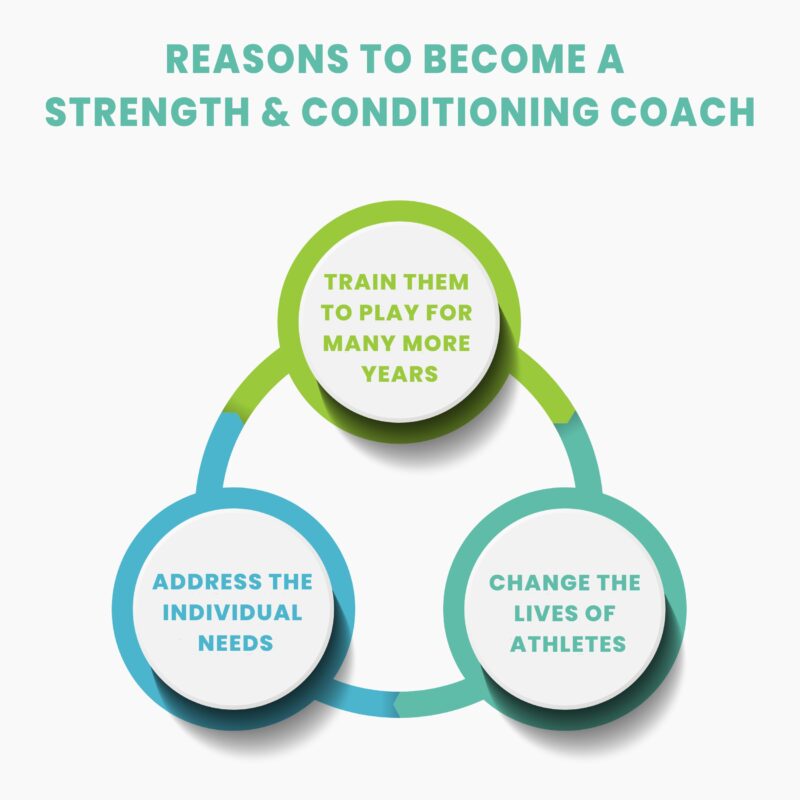
Reasons to Become a Strength & Conditioning Coach
2. Address the individual needs
As a strength & conditioning coach, you can help athletes meet their individual needs and preferences. You can assess their current level of fitness, identify their strengths and weaknesses, and design a training program that suits their goals and abilities. You can also monitor their progress, provide feedback, and adjust the program as needed. By doing so, you can help them optimise their performance and satisfaction.
3. Change the lives of athletes
As a strength & conditioning coach, you can help athletes change their lives for the better. You can inspire them to pursue their dreams and passions. You can support them through their challenges and celebrate their achievements. You can also build meaningful relationships with them and make a positive impact on their well-being. By doing so, you can help them grow as individuals and as athletes.
Conclusion:
If you are passionate about sports and fitness, becoming a strength & conditioning coach might be the perfect career choice for you. You will have the opportunity to work with different types of athletes, from amateurs to professionals, from young to old, from individual to team sports. You will also strive hard to make a difference in their lives and share your love for physical activity.
Becoming a Strength and Conditioning coach is a rewarding and fulfilling profession that offers many benefits. If you have the skills, knowledge, and passion for this field, you should consider pursuing this career path. You will not regret it!
Blog reviewed by Mr. Ramji Srinivasan, Former Head Strength and Conditioning Coach of the India National Cricket Team. Mr. Srinivasan was himself a national-level champion in 100 metres sprint and long jump. Besides the Indian team, he has also worked with the Chennai Super Kings franchise in the IPL.













